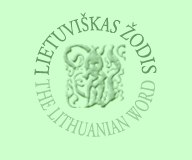- In 1871, with the rise
of the German Empire which embraced Prussia and included Lithuania
Minor, the pangermanic movement became more vigorous. The non-German
minorities were to be assimilated by acculturation into the German
community. Falk, the Minister of Education, decreed (October 13, 1872)
the removal from the schools not only of the Lithuanian but of all
non-German language programs. On his own, President Horn of East
Prussia permitted religion to be taught in Lithuanian in the lowest
elementary grade, and Lithuanian reading and writing in the highest
grade. In those schools where German pupils were in the majority,
there was no requirement that Lithuanian should be taught at all.
Steps were taken to exclude the language from public use. A new
government decree (August 28, 1872) enjoined that the German language
used at the school meetings and in correspondence. District and
village meetings were also to be conducted in German. The conservative
Lithuanian peasants, while professing fealty and loyalty to the King
of Prussia, nevertheless dared by delegations and petitions to defend
their rights. The spectacular audience with the King of Prussia and
Emperor William I of Germany in 1878 is well-known. A chorus of women
dressed in national costume sang Lithuanian songs at the royal court
and as an epilog a poem written by Georg Sauerwein for the occasion
was recited. This delegation at least gained a favorable comment in
the diary of Prince Frederick. Several petitions (1879, 1882, 1896,
1902, 1904) were submitted to the rulers of Germany but they resulted
only in unfulfilled promises or in no answer at all. In their
political activity, Lithuanians allied themselves with the
conservatives, among whom were the influential German estate owners.
Even after the revolution of February 1848, when German parliamentary
elections were being held, the Lithuanian linguist Fredrikas Kursaitis
(Kurschat) urged the formation of a Lithuanian Conservative Party and
inaugurated a newspaper, Keleivis (The Traveler), to express
his views. In 1895 the Society of Lithuanian Conservatives was
founded. It brought together the more influential farmers of the Tilze
and Pakalne districts. One of its founders, Jonas Smalakys, was the
first Lithuanian representative to be elected (1898) to the German
Parliament (Reichstag). Later Vilius Gaigalaitis was elected
(1902) to the Prussian Parliament (Landstag). The lively
promotion of Lithuanian activity and the increasing regard for
ethnological studies aroused some German scholars to become interested
in the language, folklore, art and customs of the Lithuanians. They
judged that all this should be preserved for science as a cultural
remnant of a "vanishing people." For this purpose the
Lithuanian Literary Society (Litauische Literarische Gesellschaft,
q.v.) was founded in Tilze in 1879.
- An opposing trend, and
one which sought to strengthen the national consciousness through its
organizations, was fostered in Lithuanian patriotic circles. Several
Lithuanian religious societies had already been active earlier; they
zealously safeguarded Lithuanian services and hymns and conducted
their assemblies in Lithuanian. They remained loyal to the German
authorities and maintained that loyalty and Lithuanian national action
were compatible. In 1885 Birute (the name of a fabled
Lithuanian heroine), a cultural society whose members were drawn
chiefly from the young, was founded in Tilze. Its branches, each of
which could also have its own name, organized various presentations
with songs, games and dances and became quite widespread throughout
Lithuania Minor. The Lithuanian Singers Society (Lietuviu Giedotoju
Draugija) began its activities in 1895, also in Tilze, under the
direction of its choir master, the Lithuanian writer and philosopher
Vilius Storasta-Vydunas. The singers were heard in concert in many
places. A benevolent and cultural society, Sandora (Concord),
was active in Klaipeda and the surrounding district from 1904. Of the
newspapers, the widely read weekly Lietuwiazka Ceitunga
(Lithuanian Newspaper) began publication in 1877. However, later this
newspaper fell into German hands and espoused the cause of
germanization. The more notable personages of Lithuania Minor towards
the end of the 19th century and at the beginning of the 20th were
Dovas Zaunius, Martynas Sernius, Jurgis Lapinas, Jurgis Miksas, Jonas
Vanagaitis, Enzys Jagomastas, Vilius Gaigalaitis, Jokubas Stiklorius,
and Ansas Bruozas among others. They organized and led societies,
edited and published newspapers.
- Lithuania Minor was the
country, which printed the first Lithuanian book (1547) and the first
Lithuanian newspaper (1832). When the Russians proscribed Lithuanian
publications in Latin characters in Lithuania Major (1864), a few
patriotic newspapers were printed and books were published in
Lithuania Minor. These were smuggled across the German-Russian border
(see Knygnesiai). The first such proscribed paper was Ausra
(The Dawn), which was published in Ragaine and Tilze from 1883 to
1886. Before the introduction of this unpretentious monthly dedicated
to the national renaissance, the leaders of Lithuania Major (Jonas
Basanavicius, Jonas Sliupas and others) collaborated on the Lietuwiczka
Ceitunga, but their articles and the whole idea of collaboration
between the two divisions of Lithuania were inconsistent with the
conservative character of the readers. The exceptions among the more
perceptive activists of Lithuania Minor supported the secret
Lithuanian press and collaborated with the people of Lithuania Major
in the common cause of a national rebirth.

